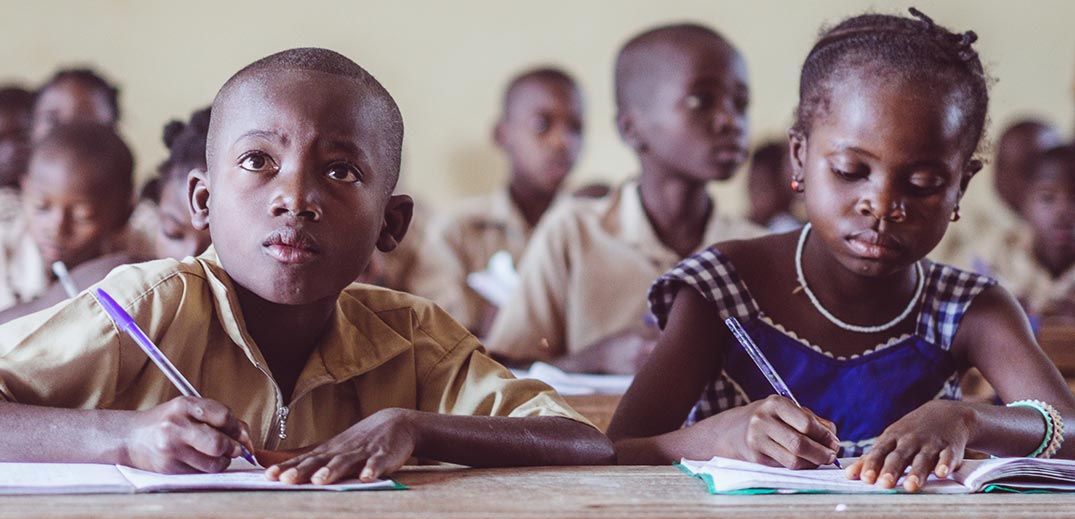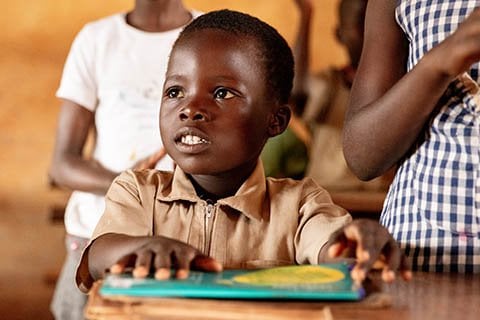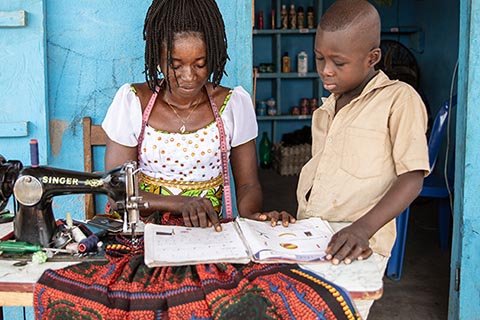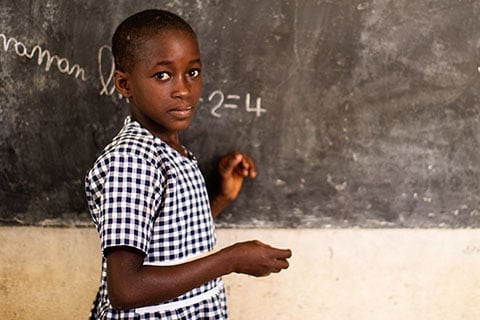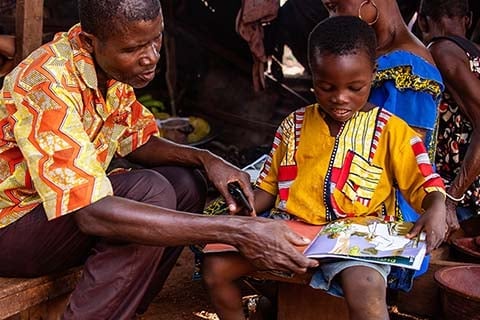How is Nestlé tackling child labor risk?
Child labor is unacceptable. Children deserve the chance to learn, to grow in a safe and healthy environment. We are committed to working with our suppliers and local communities to prevent and address child labor risks in our supply chain. Poverty, lack of access to education, and limited awareness about child safety are among the root causes of child labor. Our work seeks to take action on the ground and address these root causes, and our social impact has been assessed by independent third-parties (like the Fair Labor Association). We've worked to build and refurbish 50 schools in the Ivory Coast and enhanced access to education, ultimately protecting 128,000 children against the risk of child labor.
Additionally, by 2025, we are committed to be able to trace all cocoa back to a specific group of farms and ensure 100% of the cocoa we use is sourced within our sustainability cocoa program. Our work isn't done. In West Africa, most child labor involves children supporting their parents on farms, so we prioritize family and community engagement. We remain dedicated to helping end child labor in the cocoa industry. We address root causes of child labor while supporting farmers and communities through our cocoa sustainability program, the Nestlé Cocoa Plan.
What is Nestlé doing to prevent child labor?
Providing access to education
Education is critical to helping a child achieve his or her potential, and data shows that in communities with good quality schooling, child labor is lower (International Cocoa Initiative).
- We offer access to bridging classes for kids who have been out of school and need to catch up, as well as working directly in communities to secure school kits and birth certificates, which are required for children to attend school in Côte d'Ivoire.
- We have supported the construction and renovation of more than 50 schools in Côte d'Ivoire to date.
Impact in action
Through these measures, almost 128,000 children have been protected against the risk of child labor since 2012. Today, we keep contact with the families of over 86,000 children to assess the risk of child labor.
Overcoming poverty by promoting a stable economy and a healthy society
Poverty is one of the root causes of child labor. We strongly believe that farmers should earn an income that allows them and their families to live a decent life. Through the Nestlé Cocoa Plan, we support farmers and farming communities to improve their income and livelihoods, through measures such as training, empowering women, and creating local savings and loans associations. We also improve living conditions for communities with basic infrastructure such as water fountains.
Additionally, we are piloting cash incentives to encourage farmers to protect the forests around their farms, to plant shade trees around their cocoa trees to promote biodiversity, and to send their kids to school.
Engaging families & communities
In West Africa most child labor in cocoa involves children supporting their parents on farms, so we prioritize family and community engagement. Under the Nestlé Cocoa Plan, we help parents understand the types of tasks that are appropriate for children. As soon as child labor risks are detected across any of the thousands of households covered by the Child Labor Monitoring and Remediation System - CLMRS (pdf, 6Mb), we take action, working directly with families and communities to understand the root cause and develop tailored solutions.
We also help the community reduce risk by organizing adult worker groups, to prevent children being involved in difficult activities like pruning on farms.
Impact in action
Community liaisons visit families on a regular basis to coach, measure progress, and prevent setbacks. Working with the community and the families is key: 1,600 community liaisons from non-governmental organizations, foundations and farmers' cooperatives help us improve child welfare, village by village and farm by farm. Our remediation approach is now widely used by leading chocolate brands in our collective effort to eliminate child labor.
How do you trace where your cocoa comes from?
By 2025, we are committed to trace all cocoa back to specific farms and ensure 100% of the cocoa we use is sourced within our Cocoa Plan. 100% of the cocoa we use in products sold in the U.S. is UTZ certified and traceable.
Given the scale and complexity of the problem, we believe partnership across governments, other chocolate companies, and NGOs are essential. That is why:
- We work with national governments, local authorities, non-governmental organizations as well as other companies that source cocoa from these countries.
- Independent audits by third-party organizations, such as Rainforest Alliance and the Fair Labor Association, help drive continuous improvement.
- We welcome appropriate legislation, based on international standards, that obliges companies to identify human rights and environmental issues, to act on them and to report on their progress. We support a strong, consistent international framework for corporate reporting on human rights.
What impact has Nestlé made in the efforts to fight child labor?
Nestlé was the first company to implement a system to address child labor risk in its cocoa supply chain. We made our system to tackle child labor risk available across the industry, and it is now widely used by other cocoa-buying companies. Since 2012, we have made significant progress with this system. Approximately 128,000 children have been protected against the risk of child labor, of which more than 40,000 children increased their access to education.
Read our Tackling Child Labor report (pdf, 4Mb) and the Fair Labor Association's report (pdf, 12Mb) to learn more.
Tackling child labor
Ending child labor is a shared responsibility, and Nestlé is keen to work with everyone committed to tackling it.

Click to enlarge (pdf, 2.5Mb)
Find out more
- Tackling child labor
- Read more about responsible cocoa sourcing
- Download the infographic: Tackling child labor (pdf, 2.5Mb)
- Nestlé Action Plan on Women in the Cocoa Supply Chain (pdf, 425Kb)
- Nestlé Action Plan on the Responsible Sourcing of Cocoa from Côte d’Ivoire (pdf, 500Kb)
- Tackling Child Labor 2019 report (pdf, 4Mb)

